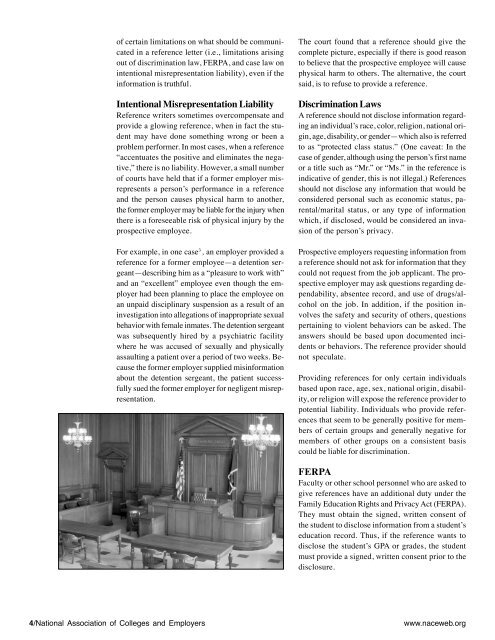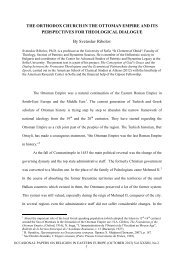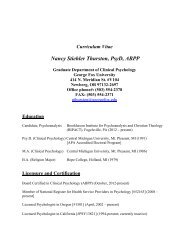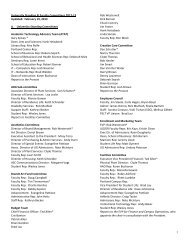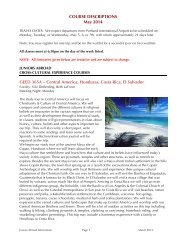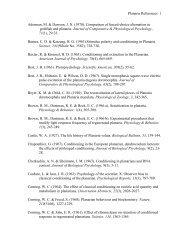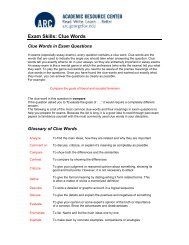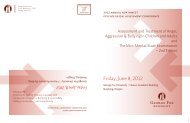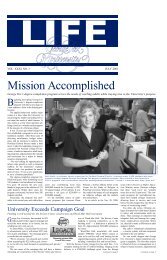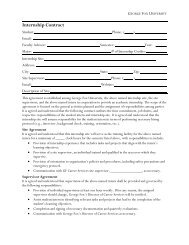References - National Association of Colleges and Employers
References - National Association of Colleges and Employers
References - National Association of Colleges and Employers
Create successful ePaper yourself
Turn your PDF publications into a flip-book with our unique Google optimized e-Paper software.
<strong>of</strong> certain limitations on what should be communicated<br />
in a reference letter (i.e., limitations arising<br />
out <strong>of</strong> discrimination law, FERPA, <strong>and</strong> case law on<br />
intentional misrepresentation liability), even if the<br />
information is truthful.<br />
Intentional Misrepresentation Liability<br />
Reference writers sometimes overcompensate <strong>and</strong><br />
provide a glowing reference, when in fact the student<br />
may have done something wrong or been a<br />
problem performer. In most cases, when a reference<br />
“accentuates the positive <strong>and</strong> eliminates the negative,”<br />
there is no liability. However, a small number<br />
<strong>of</strong> courts have held that if a former employer misrepresents<br />
a person’s performance in a reference<br />
<strong>and</strong> the person causes physical harm to another,<br />
the former employer may be liable for the injury when<br />
there is a foreseeable risk <strong>of</strong> physical injury by the<br />
prospective employee.<br />
For example, in one case 3 , an employer provided a<br />
reference for a former employee—a detention sergeant—describing<br />
him as a “pleasure to work with”<br />
<strong>and</strong> an “excellent” employee even though the employer<br />
had been planning to place the employee on<br />
an unpaid disciplinary suspension as a result <strong>of</strong> an<br />
investigation into allegations <strong>of</strong> inappropriate sexual<br />
behavior with female inmates. The detention sergeant<br />
was subsequently hired by a psychiatric facility<br />
where he was accused <strong>of</strong> sexually <strong>and</strong> physically<br />
assaulting a patient over a period <strong>of</strong> two weeks. Because<br />
the former employer supplied misinformation<br />
about the detention sergeant, the patient successfully<br />
sued the former employer for negligent misrepresentation.<br />
The court found that a reference should give the<br />
complete picture, especially if there is good reason<br />
to believe that the prospective employee will cause<br />
physical harm to others. The alternative, the court<br />
said, is to refuse to provide a reference.<br />
Discrimination Laws<br />
A reference should not disclose information regarding<br />
an individual’s race, color, religion, national origin,<br />
age, disability, or gender—which also is referred<br />
to as “protected class status.” (One caveat: In the<br />
case <strong>of</strong> gender, although using the person’s first name<br />
or a title such as “Mr.” or “Ms.” in the reference is<br />
indicative <strong>of</strong> gender, this is not illegal.) <strong>References</strong><br />
should not disclose any information that would be<br />
considered personal such as economic status, parental/marital<br />
status, or any type <strong>of</strong> information<br />
which, if disclosed, would be considered an invasion<br />
<strong>of</strong> the person’s privacy.<br />
Prospective employers requesting information from<br />
a reference should not ask for information that they<br />
could not request from the job applicant. The prospective<br />
employer may ask questions regarding dependability,<br />
absentee record, <strong>and</strong> use <strong>of</strong> drugs/alcohol<br />
on the job. In addition, if the position involves<br />
the safety <strong>and</strong> security <strong>of</strong> others, questions<br />
pertaining to violent behaviors can be asked. The<br />
answers should be based upon documented incidents<br />
or behaviors. The reference provider should<br />
not speculate.<br />
Providing references for only certain individuals<br />
based upon race, age, sex, national origin, disability,<br />
or religion will expose the reference provider to<br />
potential liability. Individuals who provide references<br />
that seem to be generally positive for members<br />
<strong>of</strong> certain groups <strong>and</strong> generally negative for<br />
members <strong>of</strong> other groups on a consistent basis<br />
could be liable for discrimination.<br />
FERPA<br />
Faculty or other school personnel who are asked to<br />
give references have an additional duty under the<br />
Family Education Rights <strong>and</strong> Privacy Act (FERPA).<br />
They must obtain the signed, written consent <strong>of</strong><br />
the student to disclose information from a student’s<br />
education record. Thus, if the reference wants to<br />
disclose the student’s GPA or grades, the student<br />
must provide a signed, written consent prior to the<br />
disclosure.<br />
4/<strong>National</strong> <strong>Association</strong> <strong>of</strong> <strong>Colleges</strong> <strong>and</strong> <strong>Employers</strong><br />
www.naceweb.org


